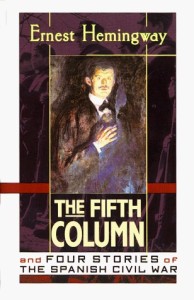 Hemingway famously chronicled the Spanish Civil War (For Whom the Bell Tolls) being his most prominent work from the period.) Probably most Americans’ knowledge of that conflict comes as much from him as from history texts, since the whole thing got pretty much drowned out by WWII. I’ve reviewed a few of Rebecca Pawel’s novels of the period, which has added to my own knowledge, and I have friends with relatives who actually joined the Lincoln Brigade, a group of American volunteers who went over to fight the Fascist Franco. Unfortunately, the western powers felt more comfortable with people like Stalin and Franco than with mercurial revolutionaries, so there was little support and little success for the insurgents.
Hemingway famously chronicled the Spanish Civil War (For Whom the Bell Tolls) being his most prominent work from the period.) Probably most Americans’ knowledge of that conflict comes as much from him as from history texts, since the whole thing got pretty much drowned out by WWII. I’ve reviewed a few of Rebecca Pawel’s novels of the period, which has added to my own knowledge, and I have friends with relatives who actually joined the Lincoln Brigade, a group of American volunteers who went over to fight the Fascist Franco. Unfortunately, the western powers felt more comfortable with people like Stalin and Franco than with mercurial revolutionaries, so there was little support and little success for the insurgents.

The volume which contains the play The Fifth Column and Four Short Stories gives another take on the action in that conflict. The Fifth Column makes it clear why Hemingway did not stake his career on playwrighting. Set in a Madrid hotel where erstatz playboy Phillip works undercover to sabotage government operations while at the same time carrying on a love affair with a shallow magazine writer, he’s created a situation so artificial as to be nearly comic. I suppose we’re supposed to see the tug toward normalcy in Phillip’s attraction to the blonde who wants him to marry, go stateside, and settle down. However, her character is so vapid, it’s hard to believe he’s attracted at all.
Nevertheless, we get a lot of insights into the kind of action that can and perhaps did take place in and around hotels among urban revolutionaries. There are are successes, failures, deaths. Every location, name, role, is temporary and every personal agenda must be subsumed to the cause.
The stories are another matter. Linked by their locale in various Madrid bars and hotels and by a filmmaking crew who is supposed to document the revolution, we meet combatants and civilians. Those who are being starved by the war as well as those who are being killed on the battlefield. So meticulously does Hemingway detail his locales and events that the prose is almost journalistic. And there’s that famous limpid prose and those wonderfully crafted sentences.
You could see it [the battle] spread out below you and over the hills, could smell it, could taste the dust of it, and the noise of it was one great slithering sheet of rifle and automatic rifle fire rising and dropping, and in it came the crack of the guns and bubbly rumbling of the outgoing shells fired from the batteries behind us, the thud of their bursts, and then the rolling yellow clouds of dust. But it was just too far to film well.
All that poetic description followed by a simple sentence about some prosaic, practical dilemma.
All in all, the volume is a worthwhile historical journey as well as an interesting, if not superlative, literary one.
